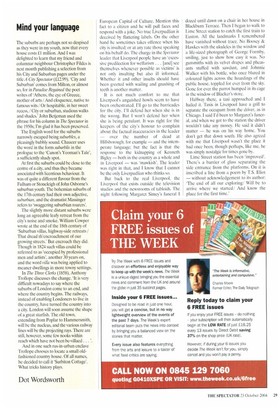Mind your language
The suburbs are perhaps not so despised as they were in my youth, now that every house costs £1 million. And I was delighted to learn that my friend and columnar neighbour Christopher Fildes is next month publishing a selection from his City and Suburban pages under the title A City Spectator (£12.99). 'City and Suburban' comes from Milton, or almost so, for in Paradise Regained the poet writes of 'Athens, the eye of Greece, mother of arts / And eloquence, native to famous wits / Or hospitable, in her sweet recess, / City or suburban, studious walks and shades.' John Betjeman used the phrase for his column in The Spectator in the 1950s; I'm glad it has been preserved.
The English word for the suburbs narrowly escaped being suburbles, a pleasingly bubbly sound. Chaucer uses the word in the form subarblis in the prologue to the 'Canon's Yeoman's Tale', a sufficiently shady spot.
At first the suburbs could be close to the centre of a city, and thus they became associated with licentious behaviour. It was of quite a different flavour from the Fulham or Stoneleigh of John Osborne's suburban youth. The bohemian suburbs of the 17th century had their own adjective, suhurbian, and the dramatist Massinger refers to 'swaggering suburbian roarers'.
The slightly more distant suburbs were long an agreeable leafy retreat from the city's noise and smoke. William Cowper wrote at the end of the 18th century of 'Suburban villas, highway-side retreats! That dread th'encroachment of our growing streets.' But encroach they did. Though in 1824 such villas could be referred to as 'occupied by professional men and artists', another 30 years on, and the word villa was being applied to meaner dwellings in more towny settings.
In The Three Clerks (1858), Anthony Trollope discusses the change. 'It is very difficult nowadays to say where the suburbs of London come to an end, and where the country begins. The railways, instead of enabling Londoners to live in the country, have turned the country into a city. London will soon assume the shape of a great starfish. The old town, extending from Poplar to Hammersmith, will be the nucleus, and the various railway lines will be the projecting rays. There are still, however, some few nooks within reach which have not been be-villaed . .
And in one such rus-in-urban enclave Trollope chooses to locate a small oldfashioned country house. Of all names, he decided to call it Surbiton Cottage'. What tricks history plays.
























































































 Previous page
Previous page